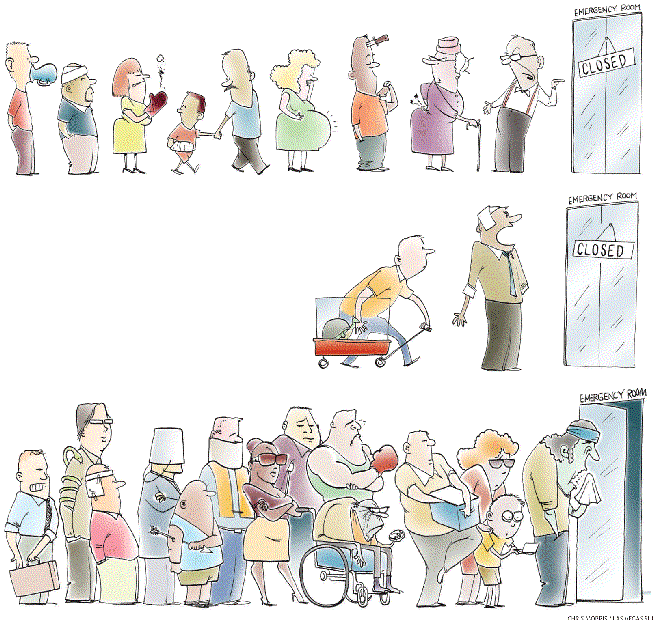Saturday, Dec. 27, 2008 | 2 a.m.
Sun Archives
- Lawmakers reach agreement on $340 million deal (12-8-2008)
- Medicaid cuts compound health, economic crises (12-2-2008)
- If a hospital is unionized, might care be better? (10-10-2008)
Beyond the Sun
Nevada hospitals are in such dire financial condition that at least two are considering closing their emergency rooms and refashioning themselves as something other than full-service hospitals, according to the head of the Nevada Hospital Association.
Bill Welch, president of the trade group, declined to say which hospitals are discussing the option.
Because emergency room patients with no ability to pay are financially draining hospitals’ bottom lines, they are considering closing and reopening as rehabilitation, psychiatric or skilled nursing facilities.
Federal law requires full-service hospitals to provide urgent medical care to anyone who needs it and appears in their emergency rooms.
By converting to another kind of medical facility, a hospital would no longer have to deal with patients who can’t pay.
The effect of a hospital closing its doors would ripple through the valley’s fragile health care system. University Medical Center, the county’s only public hospital and one staggering under the burden of caring for so many people who can’t pay, would be severely affected.
Hospitals are confronting two related and debilitating forces: The deep recession has put many Nevadans out of work, taking away their health insurance and forcing many to go to emergency rooms when they become ill. Meanwhile, state government has reduced Medicaid reimbursements to hospitals by 5 percent, which has taken money out of the pockets of hospitals that treat the poor and disabled.
There are also 4,000 children on the waiting list for Nevada Check-Up, a health insurance program for the working poor. For parents with children on the waiting list, emergency room care may be their only option.
Twice a year, the state pays between 11 percent and 16 percent of hospitals’ unreimbursed costs for care of the indigent. The Legislature froze the November payment and cleaned out the account, which will mean no June payment. In total, that will cost Nevada hospitals $25 million.
Even if hospitals don’t become something else, there will almost certainly be a reduction in services, Welch said.
“I’m aware that all of our hospitals are evaluating financial circumstances and their financial viability and determining what services they need to cut,” he said.
UMC, Sunrise, North Vista and Pahrump have cut services, he said, with more likely coming.
The situation will get worse.
Unemployment is expected to rise above the current 8 percent, meaning increasing numbers of uninsured people going to emergency rooms for care. And, an additional 5 percent cut in Medicaid reimbursement is coming.
Republican Gov. Jim Gibbons has pledged to balance the budget without raising taxes, which would require cutting state government by 34 percent. That can’t be accomplished without still deeper cuts to the Health and Human Services Department, which accounts for 29 percent of the state budget. Medicaid makes up nearly half of the Health and Human Services budget.
Acute-care hospitals are running, on average, a 0.25 percent loss, Welch said.
Assemblywoman Sheila Leslie, D-Reno and vice chairwoman of the Ways and Means Committee, said the situation has become untenable.
“We’re at the point where, if we keep cutting Medicaid, we will drive some Nevada hospitals out of business. We cannot expect them to continue operating at a loss. I’d fully understand a hospital deciding they can’t do it anymore.”
Leslie also said the news of hospitals considering closing their emergency room doors is a sign of the effect of budget cuts, not just on the poor and disabled, but soon on all Nevadans.
“If we keep cutting, we’ll severely impact public health and public safety. Sickest people get taken care of first, and we’re headed back to the days when if you have a broken arm, it can wait.”
Most valley hospital administrators are on vacation this week and couldn’t be reached for comment.
Among the hospitals with the most uncompensated care, other than UMC, are North Vista in North Las Vegas and Sunrise Hospital, which recently laid off more than 50 workers.
Sunrise delivered $88 million in uncompensated health care in 2007.
More than half the patients at Sunrise Children’s Hospital are uninsured or on Medicaid.
Sunrise Chief Executive Sylvia Young said she could not foresee Sunrise closing and reopening as a different type of facility. “With the infrastructure and capital investment, I don’t think that’s feasible,” she said.
Nevertheless, she urged the Legislature to consider the ramifications of further budget cuts.
“We think we have a moral imperative, and we think that health care should be put at the top of the list of priorities,” she said.
Sasha Jackowich, a spokeswoman for St. Rose Dominican Hospitals, said there are no plans to cut programs or close St. Rose facilities.
“Certainly ongoing reductions in Medicaid reimbursements and a prevalence of uninsured patients creates serious concern for the area’s health care institutions, but as the only not-for-profit, religiously sponsored hospital system, it is our core mission to care for our community, and we hope to be able to continue to carry out that mission even in these trying times.”
Sun reporter Alex Richards contributed to this story.


Join the Discussion:
Check this out for a full explanation of our conversion to the LiveFyre commenting system and instructions on how to sign up for an account.
Full comments policy